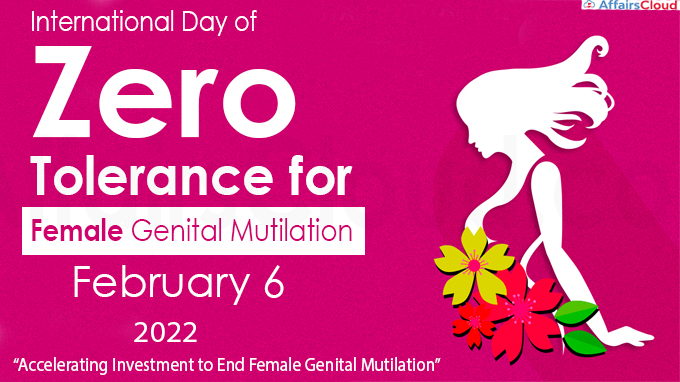
The United Nations(UN)’s International Day of Zero Tolerance for Female Genital Mutilation is annually observed across the globe on 6th February to create awareness about the effects of Female Genital Mutilations(FGM) on gender equality and women empowerment.
The day also highlights the efforts taken to eradicate FGM.
The theme of International Day of Zero Tolerance for Female Genital Mutilation 2022 is “Accelerating Investment to End Female Genital Mutilation”.
- The 2022 theme was launched by the United Nations Population Fund (UNFPA) -United Nations Children’s Fund(UNICEF) Joint Programme on the Elimination of Female Genital Mutilation: Delivering the Global Promise.
Background:
i.On 6th February 2003, Stella Obasanjo the first lady of Nigeria made the official declaration on “Zero Tolerance to FGM” in Africa during the conference organised by the Inter-African Committee on Traditional Practices Affecting the Health of Women and Children (IAC).
ii.IAC also decided to declare 6th February of every year as the Day of “Zero Tolerance to FGM.”
iii.Subsequently, UN Sub-Commission on Human Rights has adopted the 6th of February as the International Day of Zero Tolerance to FGM,
iv.The United Nations General Assembly(UNGA) adopted the resolution A/RES/67/146 on 20th December 2012 and proclaimed the 6th February of every year as the International Day of Zero Tolerance for Female Genital Mutilation.
What is FGM?
i.Female Genital Mutilation (FGM) refers to all the procedures involved in particle or total removal of the external female genitalia or another injury to the female genital organs for cultural or other non-medical reasons.
ii.It is estimated that around 200 million girls and women across the globe have been subjected to FGM.
iii.FGM is predominately practised in sub-Saharan Africa and the Arab States and it is also practised in Asia, Eastern Europe and Latin America.
iv.FGM has major consequences on the sexual and reproductive health of girls and women.
Efforts of UN to eliminate FGM:
i.The joint programme of the UNFPA-UNICEF, the largest global programme to accelerate the elimination of female genital mutilation, focuses on 17 countries in Africa and the Middle East and also supports regional and global initiatives.
ii.Under the spirit of the Sustainable Development Goal (SDG) 5: Achieve gender equality and empower all women and girls: the UN strives to eradicate the proactive of FGM by 2030.
iii.World Health Organization (WHO) and Human Reproduction Programme(HRP) have launched 2 new tools to help healthcare providers give the best quality care to girls and women who have been subjected to FGM and to also support global efforts to end this harmful practice and human rights violation.
These are:
- Person-centred communication for female genital mutilation prevention: A facilitator’s guide for training healthcare providers
- Integrating female genital mutilation content into nursing and midwifery curricula: a practical guide.
About United Nations Population Fund (UNFPA):
United Nations Population Fund (UNFPA) formerly the United Nations Fund for Population Activities, is the United Nations sexual and reproductive health agency.
Executive Director– Dr Natalia Kanem
Headquarters– New York, United States




